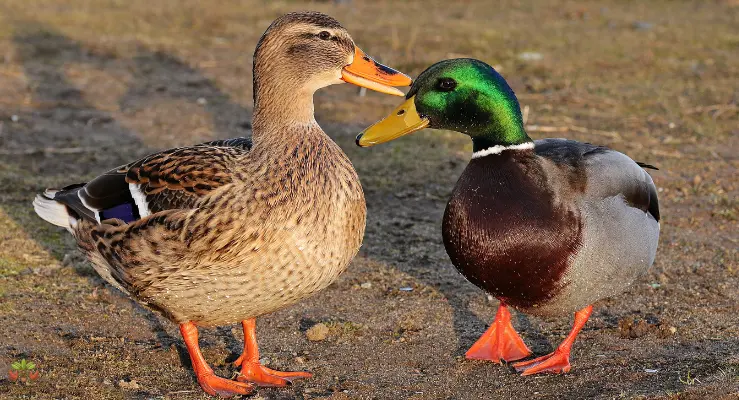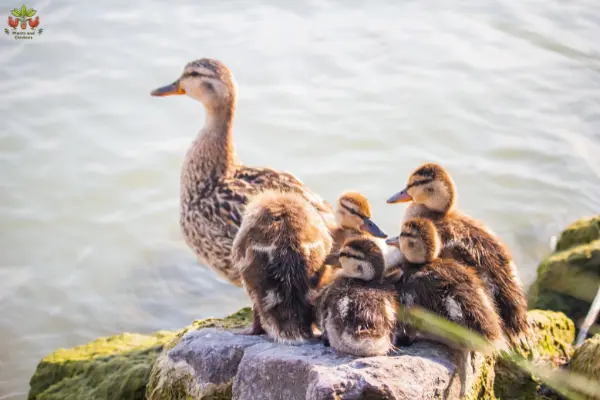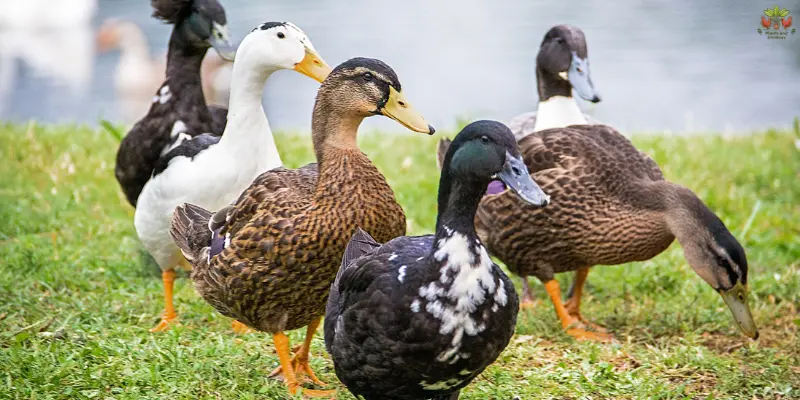If your duck is panting, it may be due to stress or feeling too hot. Make sure you provide a clean environment and take measures to keep them cool if necessary.
We will elaborately discuss Why Your Duck Pants? and what to do with Duck Panting Care
Table of Contents
Why Do Ducks Pant?
Ducks pant for a variety of reasons, and understanding why they do so is crucial for their well-being. Panting is a natural mechanism for ducks to regulate their body temperature and cool themselves down when they are feeling too hot. It is important to pay attention to your ducks’ panting behavior to ensure their comfort and prevent any potential health issues. In this article, we will delve into the reasons behind duck panting and provide you with practical duck panting care tips to address it.
Panting in ducks is a physiological response that helps them dissipate excess body heat and maintain a suitable body temperature. Unlike humans, ducks do not sweat to cool down. Instead, they pant by opening their mouth and breathing rapidly, which allows heat to escape from their bodies.
Duck panting can be triggered by various factors. Some common causes include:
High ambient temperatures: Ducks are susceptible to heat exhaustion, especially in hot weather. When the environmental temperature rises, ducks may start panting to release heat and lower their body temperature.
Stress: Just like humans, ducks can experience stress, which might lead to panting. Stressful situations, such as predator presence or unfamiliar surroundings, can cause ducks to pant as a response to fear or anxiety.
Respiratory issues: Respiratory diseases, such as bacterial infections, can also cause ducks to pant heavily. If your ducks are exhibiting other symptoms like coughing, sneezing, or nasal discharge, it may indicate a respiratory problem.
It’s essential to monitor your ducks closely to determine the specific cause of their panting and take appropriate action to address it. Providing a suitable environment, maintaining optimal temperature, and reducing stressors can all help alleviate panting in ducks.
In conclusion, understanding why ducks pant is crucial for duck panting care and well-being. Panting is a natural response that helps ducks regulate their body temperature. By identifying common causes of duck panting, such as high ambient temperatures, stress, and respiratory issues, you can provide appropriate care and support for your panting ducks.
How To Care For Panting Ducks
When you notice your ducks panting, it’s important to provide them with the proper care to ensure their well-being. Panting is a way cool way for ducks to regulate their body temperature, as they do not have sweat glands like humans do. In this article, we will discuss three essential ways to duck panting care:
Providing adequate water and shade
Ensuring proper ventilation in the duck house
Managing heat stress in ducks.
1. Provide Adequate Water And Shade
Water is essential for ducks to cool down and stay hydrated. Ensure that your ducks have access to clean, fresh water at all times. You can use a shallow container or a baby pool for them to swim in, as ducks love to splash around. Additionally, provide ample shade in their living area to protect them from direct sunlight and extreme heat. This can be achieved by placing a tarp or shade cloth over their enclosure or by providing natural shade from trees or bushes for duck panting care.
2. Ensure Proper Ventilation In The Duck House
Ventilation is crucial in the duck house to prevent heat build-up and ensure a comfortable environment for your ducks. Do some helpful for your duck panting care, Make sure there are enough windows or vents in the duck house for air circulation. It’s also important to clean the bedding regularly to maintain cleanliness and avoid any respiratory issues that may cause panting.
3. Manage Heat Stress In Ducks
Heat stress is a common issue for ducks, especially during hot summer months. Here are some tips to help manage heat stress:
- Provide frozen treats: Freeze fruits or vegetables in water and offer them to your ducks as a refreshing snack for duck panting care.
- Mist the area: Use a misting system or spray water in the air to create a cooling effect in their living space.
- Offer a shallow pool: Ducks can cool off by submerging their bodies in water. Provide a shallow pool for them to wade in and keep cool.
- Use fans: Set up fans in the duck house to improve air circulation and reduce the temperature for duck panting care.
- Monitor for signs of heat stress: Keep an eye out for panting, drooping wings, and lethargy. If you notice these signs, take immediate action to cool down your ducks.
By following these care tips, you can help your panting ducks stay comfortable and healthy. Remember to always prioritize their well-being and provide them with a suitable environment to thrive.

Preventing Panting In Ducks
Ducks, like any other living creature, have their own ways of regulating body temperature. Panting is a way for ducks to cool down and maintain a comfortable body temperature. However, excessive panting can be a sign of discomfort or even health issues. To ensure duck panting care, there are several strategies you can implement, including modifying duck housing for optimal comfort, adopting breeds or hybrids suitable for your climate, and implementing strategies to keep ducks cool.
Implement Strategies To Keep Ducks Cool
Keeping ducks cool is crucial in preventing excessive panting. Ducks are equipped with a natural cooling mechanism through their feathers and the oil glands on their skin, but they still need assistance in hot weather. Here are some strategies you can implement to keep your ducks cool:
Provide shade: Make sure your ducks have access to shady areas throughout the day. This can be achieved by providing natural shade from trees or by creating artificial shade with umbrellas or canopies.
Water sources: Ducks love water and spending time in it helps them regulate their body temperature. Provide a shallow pool or pond for them to swim in and cool off.
Misters or sprinklers: Install misters or sprinklers in the duck area to create a cooling effect. This can provide relief from hot weather and prevent excessive panting.
Frozen treats: Offer frozen treats such as watermelon or berries, which can provide a refreshing and cooling experience for ducks.
Modify Duck Housing For Optimal Comfort
The housing arrangement for ducks plays a significant role in their comfort levels. By making some modifications to their housing, you can do something for duck panting care and help prevent panting in ducks:
- Ventilation: Ensure proper ventilation in the duck house to promote air circulation. Consider placing vents or windows strategically to allow hot air to escape.
- Insulation: Insulate the duck house to keep it cooler during hot weather. This can be done with appropriate insulation materials or by choosing a location with natural shade.
- Bedding: Use suitable bedding materials that provide insulation and absorb moisture. This will help keep the duck house cool and comfortable for the ducks.
- Avoid overcrowding: Overcrowding can increase the body heat generated by ducks, leading to excessive panting. Provide enough space for each duck to move around and stretch their wings comfortably so duck panting care then you will understand.

Adopt Breeds Or Hybrids Suitable For Your Climate
The choice of duck breeds or hybrids can also impact their ability to cope with different climates. Certain breeds or hybrids are better suited for hot or cold climates, which can help prevent panting in ducks:
| Breed | Climate Suitability |
| Indian Runner | Hot climates |
| Cayuga | Cold climates |
| Muscovy | Adaptable to various climates |
Consult local experts or breeders to determine which duck breeds or hybrids are most suitable for your specific climate.
By implementing strategies to keep ducks cool, modifying their housing for optimal comfort, and choosing suitable breeds or hybrids, you can be done your job for duck panting care to prevent excessive panting in ducks. This will contribute to the overall well-being of your ducks and ensure they are comfortable in their environment.
Frequently Asked Questions On Why Is My Duck Panting Care For Panting Ducks
Do Ducks Pant When Stressed?
Ducks may pant when stressed or feeling a bit hot. Panting can be a sign of illness or discomfort. Monitor your duck’s behavior and environment to ensure they are not overheating or experiencing any other sources of stress. Seek veterinary attention if necessary.
How Do You Know If A Duck Is Stressed?
Ducks can exhibit various signs of stress, including lethargy, loss of appetite, weight loss, diarrhea, and feathers remaining ruffled open. Panting can also be a sign of stress or if the duck is feeling hot. It’s important to provide a clean and comfortable environment for ducks to avoid stress-related issues.
Why Is My Duck Breathing Heavily?
Ducks may pant when stressed or feeling hot. Panting can also be a sign of respiratory disease caused by bacteria or a sign of illness in ducklings. Monitor for signs of heat stress and provide immediate vet attention if your duckling is panting with abdominal heaving.
How Do You Know If A Duck Is Too Hot?
Ducks can show signs of being too hot by panting, fanning themselves with their wings, and acting lethargic. They may stumble or have difficulty walking. If you notice these signs, move them to a cooler area and dip their feet in cool water.
Conclusion
Panting in ducks can be a result of stress or feeling too hot. It is important to provide them with a comfortable environment and monitor for signs of heat stress. Panting can also be a sign of illness, so it is crucial to seek veterinary attention if accompanied by other symptoms.
By taking care of your ducks’ needs and addressing any underlying issues, you can ensure their health and well-being.


![Terrifying Trend: Why Do Roosters Chase Humans? [2024]](https://plantsandchickens.com/wp-content/uploads/2024/02/why-do-roosters-chase-humans-4.webp)


Leave a Reply